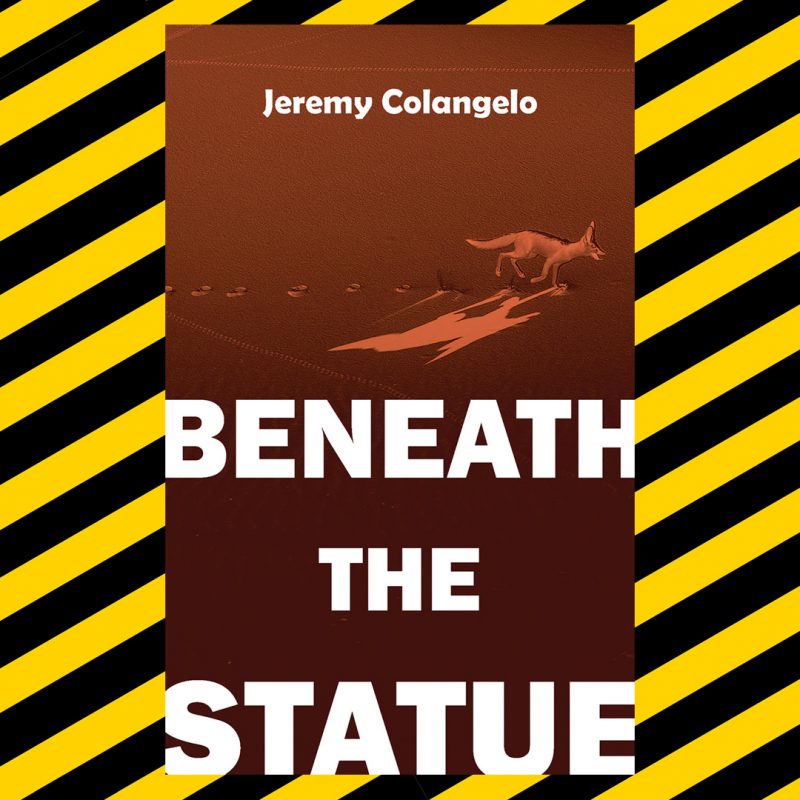USEREVIEW 036: A Colossal Problem
There was supposed to be a review of Jeremy Colangelo’s debut short fiction collection Beneath the Statue (Now Or Never Publishing, 2020), but due to unforeseen circumstances, there will be none. To find out what led to this utter catastrophe, please read on.
ISBN 978-1-98968-910-3 | 184 pp | $19.95 CAD
#CAROUSELreviews
#USEREVIEWEDNESDAY
Dear Jade Wallace, Reviews Editor for CAROUSEL,
Thank you for sending me a review copy of Jeremy Colangelo’s debut short fiction collection, Beneath the Statue. I read it, I enjoyed it and I would be delighted to review it, only you see there is one small problem: I cannot.
Granted, from your perspective, that is perhaps more than a small problem. Actually, reflecting on it further, it is probably a significant problem. Maybe that is still an underestimation. Allow me to retire for a few minutes to consider the true scope of this conundrum.
All right, I am returned and, having thought about the situation in detail for several minutes while staring melancholically out the window — during which time a little amber fox dashed through my yard to take shelter beneath my neighbour’s ornamental stone fountain — I have come to the conclusion that it would, in fact, be appropriate to call this problem colossal. Monumental, even.
Regardless, there is absolutely nothing for it. I cannot write the review because I do not possess the necessary talent to write the review. I am, as you know, capable of writing reviews in general. I have written several. And while it might be a stretch to call them tremendous they have undoubtedly been acceptable. If I am being honest, it was rather a shock to me (as I am sure it is to you as well) to find that I am unable to write the review.
Firstly, I expect you will want to know why I cannot write the review. That is a simple question to answer: the book is too good. Anything I have to say about the book will make me sound like an oily toadeater. Unctuous, obsequious, sycophantic. What does it matter if I am earnest in my praise? A critic must be capable of criticism and if they are not then they should not be trusted. Do not trust me. Take back this book and find someone who can assess it with a clear head.
Secondly, then, you probably want to know how I came to realize that I was inadequate to the task of this review. The short answer is that it dawned upon me, slow and sure, the morning sun rising incrementally higher with every page I turned until there was no denying the glaring fact. The long answer (the one you are really after, surely), will require us to begin at the beginning.
The Forever Pit
In this first story, we meet Alfred, a luckless sanitation engineer who has happened to fall into a very large, possibly infinitely large, hole. With a title such as this, one expects that the tale will go on for a great deal longer than three pages, though it is to Colangelo’s credit that it stops suddenly, for by crafting it thus he achieves two rapid successes: 1) he subverts our expectations and delivers and an ironic surprise; and, 2) he pithily and definitively weighs in on a long-standing cosmic question — is the universe infinite? — with an answer that resounds as decisively as a body hitting the ground from a great height.
Once Again
With all of the repetition (or, as Stein would say, insistence) that this title implies (and none of the redundancy that it might), this story unfolds, a dreamy and coiling parable about the totalizing reach of carcerality. You could spend hours reading the more than 400 pages that constitute Joseph Heller’s satirical literary classic Catch-22 in order to understand the novel’s eponymous conceit, or you could just read Colangelo’s brief telling of Prisoner Six’s earnest efforts to escape an impossible prison whilst resisting imminent fatalism.
Unconditional Love
By some enchantment that I cannot understand, and of which I am therefore deeply suspicious, Colangelo manages to make his ‘realist’ stories even stranger than his speculative stories. As a brief aside, I should note that I am not, in calling this story ‘realist,’ attempting to condemn it as an instance of a rightfully passé genre; rather, I mean only to draw attention to the fact that the events of this story could possibly, even plausibly occur on the very Earth that you and I inhabit. What makes this realist story strange, I think, is Colangelo’s otherwordly patience for his characters — here, two harried parents and their hapless child — who, on a short road trip, prove themselves to be detestable in the most ordinary, and therefore most vexing, ways. (The parents, that is; the child is quite innocent.) Yet Colangelo is a writer who, somehow, despite having an incisively critical eye for his characters’ small faults and hypocrisies, and a full awareness of their maddening banality, is ultimately charmed by them. And, at a certain point, the reader begins to be charmed by them as well.
I could spend a great deal more time moving sequentially through all the stories in order to enumerate their accomplishments, but I am sure you will be wanting to get on with either finding another reviewer for this book, or else resigning yourself to filling the slot that was supposed to be occupied by a review of this book with the review of an entirely different book (and, to be clear, it is the latter that I would recommend), so allow me to skip ahead to the end and wrap things up here.
Corpse Menagerie
By the time you arrive at the final story of this book, which takes its epigraph from Franz Kafka’s ‘The Hunger Artist,’ you will feel a great sense of fulfillment. Yes, you will say to yourself, I intuited Kafka’s influence on Colangelo all along and now I am vindicated. ‘Corpse Menagerie’ follows Kay, an apprentice death artist who helps her mentor, Wilco, stage his elaborately performative death scenes for audiences. If ‘The Hunger Artist’ can be said to have attained the status of myth, then ‘Corpse Menagerie’ is its contemporary reimagining, gesturing to the exhibition of suffering that cultural workers are expected to enact for ever-decreasing pay, a torment they escape only by ‘retiring,’ which is actually just a euphemism for dying. The story is all the more devastating, however, when we realize that the phenomenon it describes is not an allegorical, hyperbolic representation of the artist’s life, but a barely-disguised depiction of the lives of all workers under neoliberalism.
I hope you better appreciate, now, why I cannot review Beneath the Statue, and please accept my apologies for the delay caused by it having been misdirected to me. Also — and understand that I do not mean to alarm you by saying this, I considered not even mentioning it, but decided that I would be remiss to avoid it — I harbour a fear that in fact there is no one possessed of the requisite skill and self-restraint to review this book objectively. This is speculation on my part, yes. Extravagant and fanciful conjecture it may prove to be. However (and I say this only out of concern for you and the solemn duty you must fulfill as reviews editor) it might be time to consider what you will do with books such as this that prove to be unreviewable.
Warmly, graciously, sincerely,



